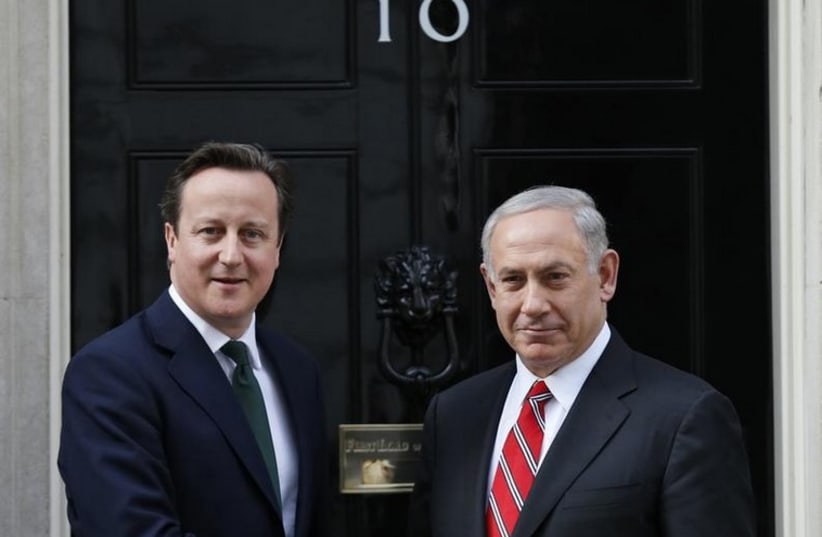See the latest opinion pieces on our page
According to a YouGov poll there, almost two-thirds of the public did not think the quality of the British press had improved since the Leveson inquiry which investigated press ethics and law violations (discussed in previous columns). Does anyone think that Israel’s media has improved its political coverage over the years? More relevant to the situation here in Israel, threefifths of the respondents in England lack confidence in the self-regulation system set up by the newspapers and 59 percent support tougher regulation of the press.The study found support for tougher regulation even among the readers of newspapers that have been most opposed to stronger measures. Mention “regulation” in Israel and you will be abusively attacked.In an unusual move, opposition Labour leader Ed Miliband gave an interview to Russell Brand, a comedian and actor with 9.6 million Twitter followers and his own YouTube channel, and Brand publicly endorsed Miliband. Miliband even tweaked press magnate Rupert Murdoch during the interview, saying: “The British people have a lot more sense than some of these papers give them credit for.” Words that return to haunt. But even London School of Economics media professor Charlie Beckett said Miliband’s move made sense: “Russell may get better cutthrough than Rupert.” The media provided extra spin, mocking Conservative Party leader David Cameron’s attempts to consider Brand and Miliband themselves as a joke.In the end, Brand’s effect on the voting probably matched that of our own cultural icons, Yair Garboz, Natan Zach and others of the far Left, and drove voters in the opposite direction. The presumptuous self-importance of media-linked personalities took a hit in both election campaigns. The day after the count, they realized that they lived “in a bubble” of their own making, linked with the inability, or worse, unwillingness, to step outside and investigate the real world.Another failure of perception was provided by David Yelland, a former British newspaper editor, who said, “The era, both here and in the US, of newspapers endorsing candidates and the feeling that that carries weight, that has gone.” We are not sure that Arnon (Noni) Mozes agrees with that opinion. Mozes, the owner and publisher of Yediot Aharonot, led the attacks against Prime Minister Benjamin Netanyahu, threw the full weight of his media power and influence behind the campaign to defeat Netanyahu – and continues to do so. His methods are unethical, his media’s professional standards are wanting.Haaretz continued its own nasty opposition to the Likud and Netanyahu on Sunday, linking Cameron to its perception of how they both won with this headline to Anshel Pfeffer’s “analysis”: “Cameron’s surprising election victory owes a lot to the fear factor, a la Netanyahu.” We thought that the Tory victory was dependent not “a lot” on fear but other factors such as the economy. And if fear was a factor, of what were the Scots afraid that they wiped out the Labour Party north of Hadrian’s Wall? Should analysts not be held to some standard of consistency? The left-leaning Independent predicted that Cameron would use his majority to pursue “a radical agenda” which would cut welfare, shrink the size of the state and re-define Britain’s relationship with Europe. It then quoted, anonymously (as our local media does) “Conservative insiders” that he would move to the Right after years of compromise with the Liberal Democrats.Reading the minds of political leaders is also practiced in Israel in an attempt to rein in politicians who do not toe the media line.In England, as Netanyahu did here, politicians attacked the press. Labour politician Sadiq Khan declared: “The problem is if someone reads a hostile paper day after day, after a period of time they might start believing the nonsense that’s being written.” And across the aisle, the government’s culture secretary Sajid Javid accused the BBC of ethics violations. After calling one particular item “very, very anti-Tory” (Scottish comic Rhona Cameron called the Tories a “cancer”), he intimated that the job of changing the way the press is regulated, in an upcoming BBC charter review, would include an investigation into bias. He made it clear that the corporation’s license fee could be cut if his party returns to power (which it did).Here in Israel, the media response to any attempt by politicians even to raise the subject of change within the media, even the state-sponsored networks, is to have them led to the whipping post. Incidentally, Israel’s Zionist Union co-leader, Isaac Herzog, used the term “virus” in his attack last week on Netanyahu’s coalition maneuvering, but there was no media protest.On the other hand, as Dror Eydar noted in his Israel Hayom column of April 29, the political figure who Israel’s Left portrayed as a fascist now “is being painted as a romantic figure. [Avigdor] Liberman hasn’t been attacked for the promises he made before the election, for his declarations of supposed commitment to the right-wing camp...Why should they go after Liberman? Because anyone who could smash the Netanyahu coalition is welcomed.”He listed Yediot’s Nahum Barnea, Sima Kadmon and Shimon Shiffer as the paper’s cheering squad who praised Liberman’s bowing out of the coalition.Alastair Campbell, formerly Tony Blair’s press spokesman, in a pre-election address, pointed to a central problem media consumers are forced to suffer here as well: “My complaint about newspapers has never been that they are biased...[but that] the broadcasters...allow that bias to impact on them.” There is in Israel our media elite milieu, which accepts mainly the news and views that come from within the milieu.In England, one paper acknowledged that “at times, like on Thursday, or at the recent Israeli general election, polls get it wrong.” Can we ever expect that the media will get things right?The authors are respectively vice chairman and chairman of Israel’s Media Watch (www.imw.org.il).
Media Comment: The media and elections — Britain and Israel
This past week’s election in England and that in Israel two months ago beg the comparison of what role the media played in each campaign.
